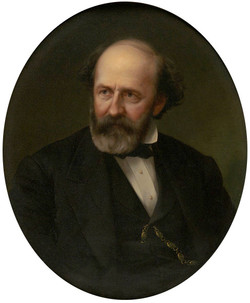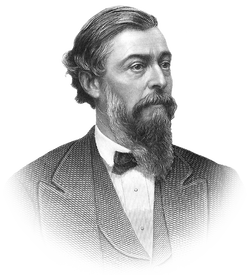 Collis P. Huntington. Source: wikimedia
Collis P. Huntington. Source: wikimedia When Dr. Durant died in 1885, Dr. Durant’s son William was on his own to navigate the nefarious jungle of business and politics in New York City at the height of the gilded age. At some point after his death, Huntington struck up a relationship with Durant’s son William. My guess is it was soon afterward, when Huntington became a board member of the Adirondack Railroad Company, a venture started by Dr. Durant to bring people into the wilderness.
While going through William West Durant’s papers at the Library of Congress, I only found a few letters written from Huntington to William. In one letter Huntington writes William that he and his wife will be visiting William’s great camp Pine Knot in the Adirondacks, traveling from their home in Throggs Neck, NY. William also hosted a dinner in New York City in the early 1890s with Huntington as a guest. Huntington appears on the guest registry of William’s yacht, the Utowana.
My research into the catalog of Huntington's papers housed at Syracuse University reveal nothing in the way of actual correspondence between the two men, but the deeds and transfers of Durant property in the Adirondacks were all there.
What I do know about Huntington from reading his biographies is that he was not a generous man, although he did befriend Booker T. Washington and donated money toward the Tuskegee Institute. Other than that, well let's just say he was not, like Andrew Carnegie, well-known for his philanthropy.
So why then, would he befriend William, support some of his business ventures, and, lend him money to do so? One biography of William suggests that Huntington, who had only an adopted son, took William under his wing as a fatherly gesture. I don't believe that was the motivation.
When William and Huntington first met, things were not going all that swimmingly for the robber baron. Huntington and his business dealings with the Central Pacific, were under investigation in 1887 by a special commission appointed by President Cleveland. The government wanted its money back, plus interest from the Union Pacific and Central Pacific Railroads. The Central Pacific had also some questionable book keeping, and the government suspected that like the Union Pacific Railroad, the company had inflated construction costs for the founders' monetary gain. If Dr. Durant had been alive, he would have been called to the witness stand as well.
But Huntington, I've come to learn was wily. One source I read states that Huntington had nothing to worry about, he had burned any incriminating evidence. He even had the audacity to continue to bribe and cajole congressmen to delay the payments, at the same time he was defending his actions as head of the Central Pacific!
Newspapers that covered the special hearings stated that Huntington was clearly avoiding the truth, using obfuscation, and what one deemed 'almost denial'. I had to wonder, did Huntington befriend William believing that he might be in possession of documents once owned by Dr. Durant that he could use in his defense? Or did he covet the land that Dr. Durant had accumulated in the Adirondacks while both men were building their railroad empires?
Ultimately Huntington's generosity toward William ended with his death in 1900. This after he had purchased William's first great camp, Pine Knot at a greatly reduced price and had most of the rest of the Durant land holdings held as collateral for the loans he gave to William; loans which William could not pay back. One wonders if Huntington knew this would be the case and had planned the eventual takeover of the Durant lands all along.

 RSS Feed
RSS Feed
